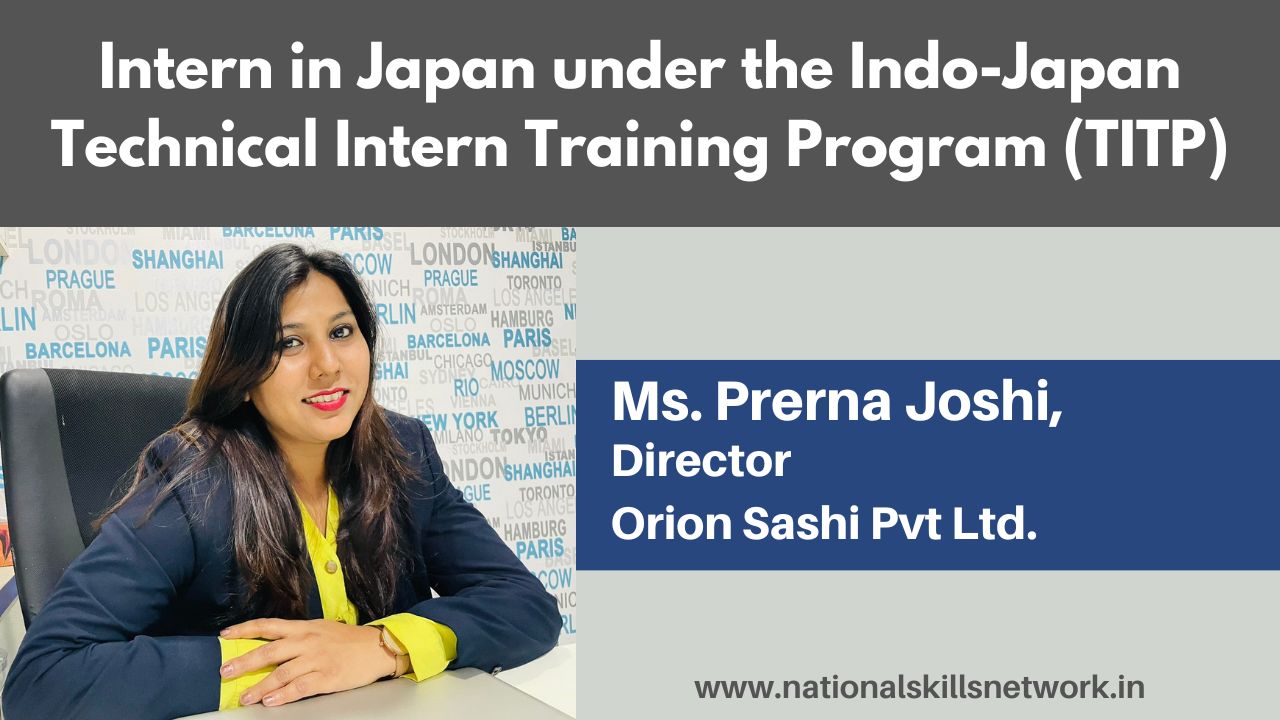The Indo-Japan Technical Intern Training Program (TITP) helps many Indian youth get employed in Japan and enhance their careers by getting trained in the Japanese language and domain skills. This program ensures holistic skilling, counselling and sustainable livelihood that caters to the youth and provides a platform to prepare youth for various industry sectors such as Healthcare, Construction, Agriculture and more.
To learn more about career growth for the Indian youth, employment opportunities in Japan, emerging job roles in different industry sectors, and training in the Japanese language and the Japanese culture, we conversed with Ms. Prerna Joshi, Director, Orion Sashi Pvt Ltd.
Here are the excerpts from our conversation; you can watch the full video interview on our YouTube channel.
Q: Please tell us more about the role of Orion Sashi Pvt Ltd. as a Sending Organisation and about how TITP works.
A. Orion Sashi was one of the first few organisations that received approval from NSDC and were designated as Sending Organisation (SO) under the Indo-Japan Technical Intern Training Program (TITP), which the governments of India and Japan initiated in 2017.
As a SO, we collaborate closely with NSDC. We update NDC every month with information about the candidates we train and the activities they are participating in. NSDC also set up workshops for us, which helped us learn more about the Japanese client. We had the chance to connect with the Supervising Organisations (SVOs), at a conference that was organised by NSDC in 2019.
Two organisations play an important role under TITP:
- Sending Organisation (SO) – Governed by NSDC
- Supervising Organisation (SVO) – Governed by JITCO
While SVOs are the ones that have a demand, we, as SO, are the source for interns. They have clusters for each industry that collaborate and supply us with demand. We arrange and train candidates and then send them to Japan, following the requirements from the SVOs.
Japan is very particular about its culture, punctuality, and timing, and thus takes time in choosing the ideal candidate. Rather than accepting a large number of candidates, they believe in the calibre of the candidates. The most important trait they look for in a candidate is patience.
The importance of having a network in Japan
We have staff members and a consortium partner in Japan who handles business development. We also have one of our directors there, who oversees bringing clients from Japan, arranging interviews and maintaining frequent communication with them. We also hold training sessions, where we invite Japanese speakers to give guest lectures. This gives candidates a glimpse of the life they will lead after the documents are submitted for immigration.
Opportunities for Indian youth in Japan
According to Japan International Trainee and Skilled Worker Cooperation Organization (JITCO), every year there are openings for more than seven and a half lakh candidates in different sectors, mostly in Construction, Automotive, Agriculture, and Healthcare, thus creating more job opportunities for candidates in India.
Importance of Japanese Language Proficiency
A candidate can apply for an internship or job in Japan if they have an N4 proficiency in the Japanese language. After receiving an employment contract, the Japanese language training for the N4 and N5 levels can take up to 6–8 months, and the documentation process can take another 6–7 months.

Q: What are some of the in-demand industry sectors in Japan?
A. Every year, there is high demand in the healthcare sector. However, there is a demand for this industry on a global scale and not just in Japan. With respect to Japan, currently, there is a huge demand in the automotive and construction industries. Along with these, Hospitality and Agriculture sectors are the two in-demand sectors that we are focusing on for the year 2023–24, to train the right candidates and send them to Japan under TITP.
Also read: TITP – Empowering Indian youth through skill training in Japan – https://nationalskillsnetwork.in/titp-empowering-indian-youth-through-skill-training-in-japan/
Q: How can one become a Sending Organisation (SO)?
A. A consortium or physical presence in Japan is essential for becoming a Sending Organisation (SO). Once the organisation is designated as a SO, the second responsibility is to look for demand, since, in the end, one needs to have candidates to send to Japan. SVOs which are monitored by JITCO, take care of the documentation process. The SVO’s take the documentation to the Organization for Technical Intern Training (OTIT) and obtain the necessary approvals after the documents have been sent from the SO to the SVO.
Q: What is the positive impact of the TITP program on the candidates?
A. The eligibility criteria for the candidates under the Indo-Japan Technical Intern Training Program (TITP) is 18 to 28 years of age. For candidates who have difficulty in choosing a stream to build their career after they complete their 12th grade, we counsel and guide them to choose a stream they are interested in. It has a positive impact not only on the candidates but also on the community and the economy at large.













